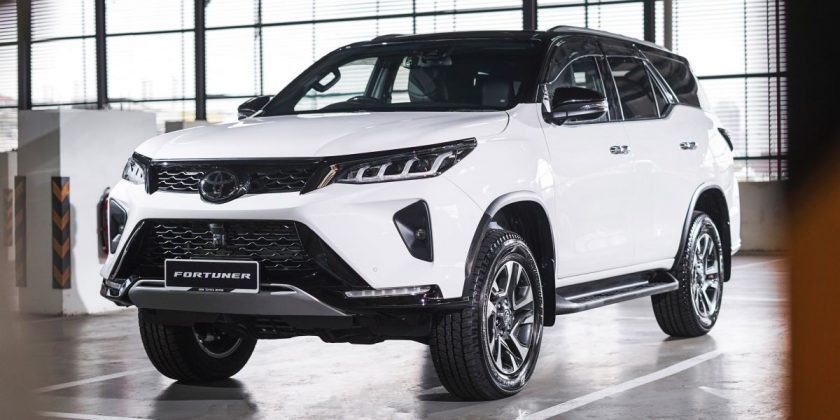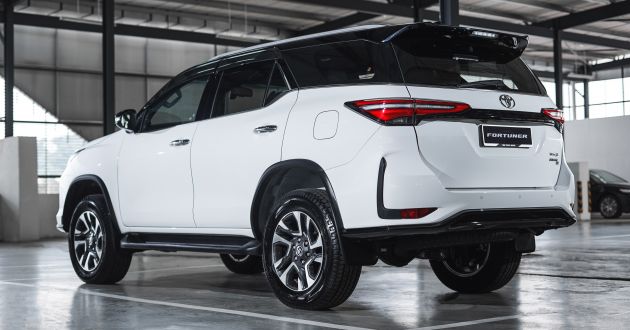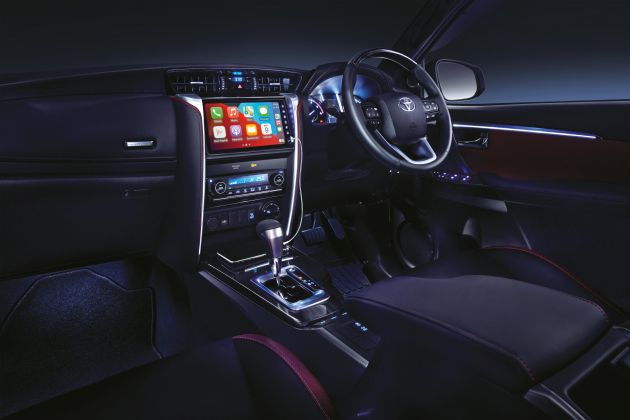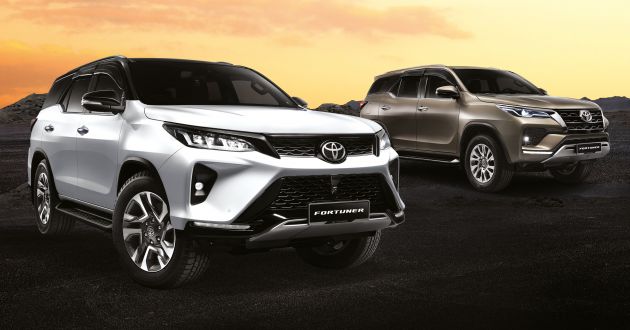Nearly a month after the order books opened, UMW Toyota Motor (UMWT) has finally launched the 2021 Toyota Fortuner facelift. The range includes the petrol-powered 2.7 SRZ AT 4×4 that is priced at RM172,244, while the diesel-powered 2.8 VRZ AT 4×4 goes for RM203,183.
Both prices include the sales tax exemption that will remain in effect until June 30 this year, and each purchase comes with a five-year unlimited mileage warranty as standard. There is also a 2.4 AT 4×4 variant that’s priced at RM167,357, but this will be offered strictly in Sabah, Sarawak and Labuan.
Now, onto the refreshed SUVs. In terms of styling changes, they are pretty much the same as the Thai-spec Fortuner. The 2.7 SRZ gets a new wavy radiator grille with a strip of chrome that connects the revised bi-LED headlamps. The LED daytime running lights are positioned low, and it gets LED fog lamps and new LED combination tail lights as standard too.


The 2.8 VRZ model you see here is the only one that gets the sportier Legender face. It has a more fetching pair of LED headlights with segmented DRL arrangement, a slimmer upper grille and an angry-looking lower intake (both featuring a mesh-style insert), sleeker LED fog lamp housing, and grey painted diffuser for some tastefully added contrast.
At the back, the VRZ gets an exclusive bumper design with L-shaped design motifs at the edges, which blend into the fog lamp assembly. Other distinctive design elements include blacked out roof, A-pillars, wing mirrors, and roof spoiler. All variants get a new set of 18-inch wheels as standard, but the VRZ gets a nicer dual-tone design.
Colour options for the SUV include Medium Silver Metallic, Silver Metallic, Phantom Brown Metallic and Attitude Black Mica. The monotone colours of Bronze Mica Metallic and Super White II are available for the non-diesel variants, but with the 2.8 VRZ, these can only be ordered with an accompanying black roof – the VRZ comes exclusively with a two-tone theme.
Inside, the enhancements are pretty subtle. While the dashboard remains largely unchanged from before, the seat upholstery (with red accents) and trimmings are new. The multi-info display in the instrument cluster as well as the touchscreen head unit also get a new look. There’s even Android Auto and Apple CarPlay support this time, too.
Equipment includes automatic air-conditioning with rear vents, LED interior lamps, an ambient lighting system, an electrochromic rear-view mirror, UMWT’s Vehicle Telematics System (VTS) and side controls for the front passenger seat.
For the powertrain, the 2.7 SRZ continues to be powered by the 2TR-FE 2.7 litre naturally-aspirated four-cylinder petrol mill. It produces 166 PS and 245 Nm, all of which are channeled to the part-time four-wheel drive system via a six-speed automatic transmission. A 4WD transfer dial allows convenient transitions from 2WD to 4WD on the fly at speeds of up to 100 km/h.
The 2.8 VRZ, on the other hand, gets the larger-capacity 1GD-FTV 2.8 litre turbodiesel four-cylinder engine – it’s the same engine that is offered with the latest Hilux Rogue. With an output of 204 PS at 3,400 rpm and 500 Nm of torque from 1,600 to 2,800 rpm, the new mill is quite the upgrade over the older 2GD-FTV 2.4 litre unit with 150 PS and 400 Nm. This 2.4L mill continues propulsion duties in the 2.4 AT 4×4 that is bound for East Malaysia. Both the 2.7 SRZ and 2.8 VRZ get a rear limited-slip differential as standard.
Now, Toyota said the new 2.8L engine features an optimised cylinder block and head gasket design, complete with a balance shaft for better NVH. The oil pump can also operate in two stages for optimal pressure delivery, while a water-cooled double-pipe-type pre-EGR cooler helps to ensure optimum recirculated exhaust gas temperatures.
The 2.8 VRZ also comes with variable flow control (VFC) power steering, which helps to improve fuel economy by reducing the power steering pump’s torque usage, switching to a standby mode when the vehicle is not being steered. Steering responsiveness can be adjusted via the car’s dedicated sport mode.
Another big addition is the availability of Toyota Safety Sense (TSS). It now includes Dynamic Radar Cruise Control (DRCC), Pre-Collision System (PCS) and Lane Departure Alert (LDA). However, this is only offered with the 2.8 VRZ, along with Yaw Assist Function (YAF).
PCS here is essentially autonomous emergency braking, which operates from 10 km/h to 180 km/h. It works in tandem with DRCC (adaptive cruise control), but this can only be activated upwards of 30 km/h. YAF, on the other hand, is a form of lane keeping assist, which applies braking force to the inner wheel to steer the car back into lane. Sure, it’s less sophisticated, but it works, so long as the road markings are legible.
For accessories, UMWT is also offering a range of optional Tech-Up accessories, including a rear digital video recorder (RM350), a wireless charger in the front armrest storage cubby (RM490), a kick sensor for the powered tailgate (RM750) and a ceiling-mounted monitor (RM2,990). So, what do you think?
Source: Read Full Article




